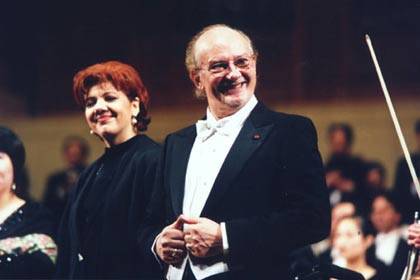Giuseppe Giacomini on YouTube. III PART. “The Beautiful Sound is the One Deep Inside Me”
Journalist: How do you make your palette of sounds? How do you understand that one sound is more beautiful than another. Does it depend also on the opera or the text you have to sing? Therefore you go forward to find that sound, because it is not even a color, it’s a sound.
Giacomini: Yes, I would use the word sound, but I don’t make any distinction between beautiful or ugly sound - sure if it’s ugly I try not to sing it – but the beautiful sound is the one deep inside me, the sound that is colored by my intimacy, that carries out my emotion. Suffering or rejoicing are really close to each other, almost the same thing. There is not such a great separation between grief and joy. One cries also when he or she is happy. The beautiful sound for me is the one that is loaded with great emotions. I’ve always been looking for this: this sound that takes all my soul, that – no matter whether I’m saying the word Amore or I’m shouting – has plenty of my intimacy. That’s the beautiful sound. Surely it must be sung with the discipline of the technique, always, but this is the beautiful sound in my opinion because it’s rich with emotions, it’s rich with my soul.
“Affondare”, l’affondo is the accelerator of the engine. If you push your foot and put a block on the pedal, the pedal remains there and the engine will keep the power. Every sound in general must be considered in a vertical dimension, never in an horizontal dimension…
Journalist: Therefore it’s a very low support?
Giacomini: It is, but consider also what the physical limits are. If you open the mouth a little bit, you don’t open it because you want to. The instinct to open the mouth has to come from the diaphragm. The diaphragm gives you the possibility to open or close your mouth a little bit more. Everything happens inside. It’s inside that all the muscles must be coordinated. Leave the vocal cords in peace: “We have 4 vocal cords, two are good, two are crazy”… but what do they mean? BASTA (that’s enough)!
Journalist: The vocal cords are only the medium. But the throat must be a pipe, the larynx low …
Giacomini: It should be so…
Journalist: This should be something that the singer is already looking for…
Giacomini: But we can’t study these things, otherwise we would be surgeons; we are there to analyze the vocal cords. Come on, I know why they vibrate. This is the only thing you need to know. But you have to make them vibrate in the right way and find this coordination that makes your body vibrate from the groin up to the chest. The vibration has to be appropriate to your body, it doesn’t have to create any tension…of course there are moments of particular effort while singing, but the effort is directed to the coordination of all these muscles. That’s the way you get the ‘affondo’ (he imitates a piston with his hands) and more colors, because the color doesn’t really come from the head resonances, but from the lower part of the face. The higher part of the head is only responsible for the projection and the brightness of the sound. But a voice that hits only in the head cavities is always white or colorless. The color is given in the lower part.
In the past I liked the colors of many great singers but I couldn’t imitate them, because my structure is different – we need to say this. Moreover it is the bone structure – and not everybody knows it – that helps us with the sound, because if we have a bone structure that resonates, that is strong and healthy or if we have a one of a particular type…if the bone were of cotton we wouldn’t have any resonance. You have to take from the great singers if you can, but you don’t have to try to push your sound in that direction, because the sound of the singer you like is the result of his bone and face structure and we don’t all look alike.
Journalist: Everytime you study, even though it’s the same opera, you have to adapt your throat to the score.
Giacomini: Absolutely, yes. Also in this case there are limits. You can’t go further than a certain point. The scores we are talking about have been written by souls that really knew how to write: rarely you find a sound that is out of place there, because these melodies came from inside. All the scores and the composers are different, so you definitely have to find a different position for the diaphragm and different sounds according to the need of that score.
One must recognize the essence of a score in depth. This is our duty. If you have to sing a role that you have sung five months or a year ago, you still have to review the whole part, because your muscles respond differently or you suddenly feel a phrase in a different way. That means to go into something thoroughly. You can’t say: “Ah, ok I’ve learned it, tonight I’m going to sing Trovatore, tomorrow Elisir” or “I know this role musically, memory helps me” etc…No!, gentlemen, this is not singing. You can get along for a short amount of time in this way, but you’ll never have time to analyze in depth, absolutely not. Even though it’s the same opera – and I can tell you based on my experience of 40 years and with a repertoire that never gives the voice any respite – I still discover and find a deep and new intensity in the score, which is different from what I found in the same score years ago: the sound may have lost something, but it is enriched by many other things. This is the bad mistake that the new generation of singers makes. They think that once you’ve learned the role you can nail it on the wall, basta. No, no, you must re-debut it every time you sing it and you will be rewarded inside for the ever new situation. In that case you are no longer just a professional, you are a SINGER.
Journalist: One doesn’t have to be in a hurry to learn how to sing, right?
Giacomini: No!
Journalist: One must learn to wait?
Giacomini: Absolutely… learn to wait!





































i-Italy
Facebook
Google+
This work may not be reproduced, in whole or in part, without prior written permission.
Questo lavoro non può essere riprodotto, in tutto o in parte, senza permesso scritto.